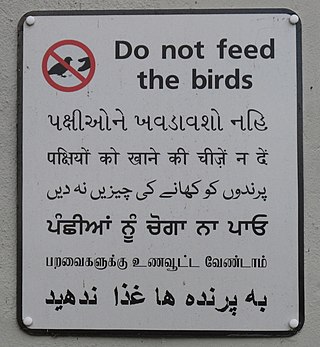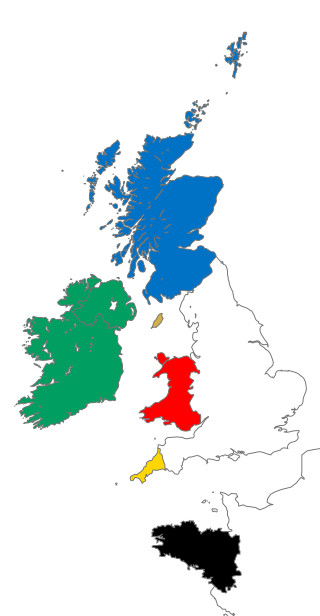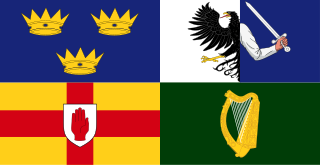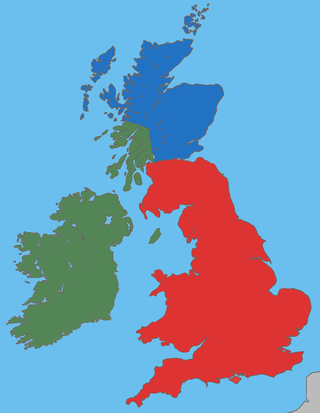
The Brittoniclanguages form one of the two branches of the Insular Celtic language family; the other is Goidelic. It comprises the extant languages Breton, Cornish, and Welsh. The name Brythonic was derived by Welsh Celticist John Rhys from the Welsh word Brython, meaning Ancient Britons as opposed to an Anglo-Saxon or Gael.
Celtic, Celtics or Keltic may refer to:
Toponymy, toponymics, or toponomastics is the study of toponyms, including their origins, meanings, usage and types. Toponym is the general term for a proper name of any geographical feature, and full scope of the term also includes proper names of all cosmographical features.
The toponymy of England derives from a variety of linguistic origins. Many English toponyms have been corrupted and broken down over the years, due to language changes which have caused the original meanings to be lost. In some cases, words used in these place-names are derived from languages that are extinct, and of which there are no known definitions. Place-names may also be compounds composed of elements derived from two or more languages from different periods. The majority of the toponyms predate the radical changes in the English language triggered by the Norman Conquest, and some Celtic names even predate the arrival of the Anglo-Saxons in the first millennium AD.
Anglo is a prefix indicating a relation to, or descent from England, English culture, the English people or the English language, such as in the term Anglosphere. It is often used alone, somewhat loosely, to refer to people of British descent in Anglo-America, the Anglophone Caribbean, South Africa, Namibia, Australia, and New Zealand. It is used in Canada to differentiate between French speaking Canadians (Francophones), located mainly in Quebec but found across Canada, and English speaking Canadians (Anglophones), also located across Canada, including in Quebec. It is also used in the United States to distinguish the Latino population from the non-Latino white majority.

English, in various dialects, is the most widely spoken language of the United Kingdom, but a number of regional and migrant languages are also spoken. Regional indigenous languages are Scots and Ulster Scots and the Celtic languages, Irish, Scottish Gaelic, Welsh and, as a revived language with few speakers, Cornish. British Sign Language is also used. There are also many languages spoken by immigrants who arrived recently to the United Kingdom, mainly within inner city areas; these languages are mainly from continental Europe and South Asia.
This is a list of etymological lists.
The modern Celts are a related group of ethnicities who share similar Celtic languages, cultures and artistic histories, and who live in or descend from one of the regions on the western extremities of Europe populated by the Celts.

The English language in Europe, as a native language, is mainly spoken in the United Kingdom and Ireland. Outside of these states, it has official status in Malta, the Crown Dependencies, Gibraltar and the Sovereign Base Areas of Akrotiri and Dhekelia. In the Netherlands, English has an official status as a regional language on the isles of Saba and Sint Eustatius. In other parts of Europe, English is spoken mainly by those who have learnt it as a second language, but also, to a lesser extent, natively by some expatriates from some countries in the English-speaking world.

Pan-Celticism, also known as Celticism or Celtic nationalism is a political, social and cultural movement advocating solidarity and cooperation between Celtic nations and the modern Celts in Northwestern Europe. Some pan-Celtic organisations advocate the Celtic nations seceding from the United Kingdom and France and forming their own separate federal state together, while others simply advocate very close cooperation between independent sovereign Celtic nations, in the form of Breton, Cornish, Irish, Manx, Scottish, and Welsh nationalism.
In etymology, two or more words in the same language are called doublets or etymological twins or twinlings when they have different phonological forms but the same etymological root. Often, but not always, the words entered the language through different routes. Given that the kinship between words that have the same root and the same meaning is fairly obvious, the term is mostly used to characterize pairs of words that have diverged at least somewhat in meaning. For example, English pyre and fire are doublets with merely associated meanings despite both descending ultimately from the same Proto-Indo-European (PIE) word *péh₂ur.

The Welsh are an ethnic group native to Wales. Wales is one of the four countries of the United Kingdom. The majority of people living in Wales are British citizens.

The Britons, also known as Celtic Britons or Ancient Britons, were the indigenous Celtic people who inhabited Great Britain from at least the British Iron Age until the High Middle Ages, at which point they diverged into the Welsh, Cornish, and Bretons. They spoke Common Brittonic, the ancestor of the modern Brittonic languages.

A hydronym is a type of toponym that designates a proper name of a body of water. Hydronyms include the proper names of rivers and streams, lakes and ponds, swamps and marshes, seas and oceans. As a subset of toponymy, a distinctive discipline of hydronymy studies the proper names of all bodies of water, the origins and meanings of those names, and their development and transmission through history.

The Celtic nations or Celtic countries are a cultural area and collection of geographical regions in Northwestern Europe where the Celtic languages and cultural traits have survived. The term nation is used in its original sense to mean a people who share a common identity and culture and are identified with a traditional territory.

There are a number of languages used in Ireland. Since the late 18th century, English has been the predominant first language, displacing Irish. A large minority claims some ability to use Irish, and it is the first language for a small percentage of the population.

The languages of Scotland belong predominantly to the Germanic and Celtic language families. The classification of the Pictish language was once controversial, but it is now generally considered a Celtic language. Today, the main language spoken in Scotland is English, while Scots and Scottish Gaelic are minority languages. The dialect of English spoken in Scotland is referred to as Scottish English.
The following place names are either derived from Scottish Gaelic or have Scottish Gaelic equivalents:

The place-names of Wales derive in most cases from the Welsh language, but have also been influenced by linguistic contact with the Romans, Anglo-Saxons, Vikings, Anglo-Normans and modern English. Toponymy in Wales reveals significant features of the country's history and geography, as well as the development of the Welsh language. Its study is promoted by the Welsh Place-Name Society.

The Insular Celts were speakers of the Insular Celtic languages in the British Isles and Brittany. The term is mostly used for the Celtic peoples of the isles up until the early Middle Ages, covering the British–Irish Iron Age, Roman Britain and Sub-Roman Britain. They included the Celtic Britons, the Picts, and the Gaels.











